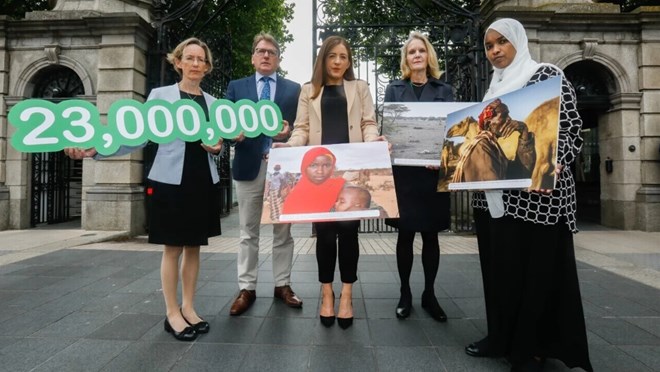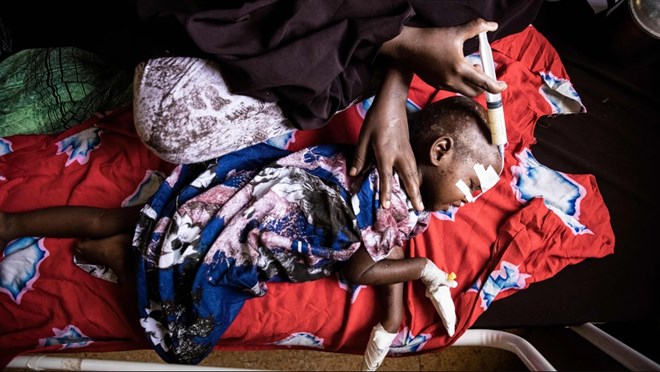RTE, By Gail Conway
Wednesday June 15, 2022
A severely malnourished two-year-old girl is fed via a tube in Banadir Maternity and Children Hospital in Mogadishu
The United Nations has predicted that 350,000 children in Somalia could die from hunger by the end of the summer.
Somalia is one of three countries in the Horn of Africa along with Ethiopia and Kenya where 23 million people are facing crisis levels of hunger – 4.6 times the population of Ireland.
In this region, one person is likely dying of hunger every 48 seconds.
advertisements
Further delayed rains have exacerbated what was already the worst drought in four decades.
Dóchas, the Irish Association of Non-Governmental Organisations, said its unacceptable that anyone anywhere should die of hunger in the 21st Century.
The organisation said that we are seeing the direct impact of climate crisis play out in real time and these countries are not receiving the global attention they need.
In a briefing to politicians today, development and humanitarian organisations including Concern Worldwide, GOAL, Oxfam Ireland and Trócaire said the threat of famine is a political failure and urged the Irish and International governments to scale up funding and act faster to end this food crisis.
Drought is not uncommon in the Horn of Africa, but it has now experienced four successive failed rainy seasons. The March-May season this year is predicted to be the driest on record representing the most severe drought in 40 years, attributed to the global climate crisis.
CEO of Dóchas Jane-Ann McKenna warned this situation could have been avoided and collective global action is needed urgently.
“There has been four years now with very little rain, so we have seen this crisis coming. The last two years there have been effective warning systems in place, but there has been global inaction. There has been a lack of political will to really address this and now we’re at the situation where 23 million people are at risk,” she said.
The climate crisis is crippling the capacity of the poorest countries to respond.
They are the most vulnerable to climate related shocks despite being the least responsible.
For example, Ireland’s population is a third of the size of Somalia’s, yet it is estimated that Ireland produces nearly 54 times higher carbon emissions than Somalia alone.
Ethiopia, Kenya and Somalia represent 2.5% of the world’s population but account for just 0.1% of global carbon emissions.
The combination of the economic consequences of Covid-19, conflict and climate change are some of the root causes that need to be addressed globally to prevent an official declaration of famine.
Ms McKenna pointed out that people are desperate for food and food assistance.
“The war in Ukraine has really just exacerbated this crisis. Many of these countries are wholly or 90% reliant on wheat imports from both Ukraine and Russia, so that food source has dried up effectively,” said Ms McKenna.
Related disruptions in grain supply, in addition to soaring prices of oil and fertilisers, are driving regional food prices to an all time high.
Comparing February 2021 and February 2022, the cost for a household to meet its essential needs increased by 92% in Sudan, 66% in Ethiopia and 36% in Somalia.
We need real, concerted, political efforts at global level to be able to radically scale up and mobilise aid into the region, she said.
“And we are asking Ireland to really use its voice at the UN Security Council to really advocate for and push for other rich nations to mobilise aid into the region to ensure that lives are not needlessly lost. Every day this crisis goes on it costs more for us to respond, so we need to act now,” said Ms McKenna.

Caoimhe de Barra, CEO Trócaire, Jim Clarken, CEO Oxfam Ireland, Jane-Ann McKenna, CEO Dóchas, Mary van Lieshout, Deputy CEO GOAL and Amina Abdulla, Horn of Africa Regional Director Concern
On the ground, the food security situation is dire, according to Amina Abdullah, Regional Director of East Africa for Concern Worldwide.
Approximately 5.7 million children are malnourished.
Based out of Nairobi, Ms Abdulla said eight agencies raised the alarm about this crisis in January last year, but claimed no action was taken with regard to providing the resources needed to respond to the situation these countries are facing now.
“You’re talking over 20 million people in need across these three countries, Kenya, Somalia and Ethiopia. This is just for the period up to September. However, if the forecast over the failed fifth rainy season comes to pass, I can’t imagine the numbers we’ll be dealing with,” said Ms Abdulla.
She noted that the needs now outstrip the resources available but if there had been action sooner then maybe they wouldn’t be dealing with so many people in need of assistance.
“Children are going for days without food, they’re ending up in nutrition treatment centres when they shouldn’t have to be there. Pregnant mothers are doing a trek of four days to get to a centre where they can access food assistance and treatment,” she said. “That shouldn’t happen in this day and age.”
Ms Abdullah acknowledged that what is drastically needed right now is food, but it will only resolve the problem short term and more sustainable solutions and investment are needed.
“This is a region that faced a locust infestation three years ago, that has been impacted by the Covid-19 pandemic that has seen people’s livelihoods destroyed, and now having to face four consecutive failed rainy seasons,” she said
“It is investments that were done in the past that have allowed communities to sort of stave off the crisis up to this moment. So, it is about looking at what is needed now, but also in tandem investing in sustaining those investments in long term solutions to address some of the underlying causes, one of which is climate change,” she added.
Mary van Lieshout, Deputy CEO of GOAL, said their teams on the ground have witnessed how the consecutive failure of rains have ravaged communities and killed millions of livestock.
“In drought affected regions of Ethiopia, over 1.5 million livestock deaths were recorded in February. Roadsides are scattered with carcasses of dead animals while communities are trying to survive due to lack of water,” she said.
Inflation levels in Sudan, South Sudan and Ethiopia are at record levels between 25% – 34%, while global inflation is impacting on how aid is being purchased and distributed.
“The cost of delivering aid has increased with higher fuel transport and shipping costs further challenging the aid sector in South Sudan, which has seen the funding steadily decrease in the last number of years even in the face of increased humanitarian needs,” said Ms Van Lieshout.
Countries that are most affected by climate change need funding for adaptation, loss and damage according to Caoimhe de Barra, , CEO Trócaire . She warned Climate finance is needed to address the long term impacts of climate change.
“We need to take a much stronger policy stance here on the island of Ireland,” said Ms De Barra.
Oxfam’s CEO Jim Clarken also attributed the threat of famine in the Horn of Africa to political failure.
“There is more than enough food in the world to feed everybody,” he said. “The famine in 2011 was the first famine in the 21st century and it should have been the last.”
Mr Clark believes the threat of famine is the biggest crisis facing the world today.
Outlining how money was mobilised in response to the global pandemic and to the war in Ukraine, he said, “the money is there but it needs to be mobilised.”
Case study: Couple cannot afford to feed children
This Somalian woman and her family moved from their village to a site for internally displaced people in Mogadishu, Somalia due to drought.
There has been a continuous drought for two years and in their village they could not plant or farm.
They could not feed their livestock which then died.
The family could not get any help where they lived so were forced to move to Mogadishu.
Despite her husband trying to find work, there are no job prospects.
She said they cannot afford to feed their children.
In their old village, before they moved to Mogadishu, she and her family were dependent on neighbours and family for help.
When they left, they took just the clothes they were wearing

